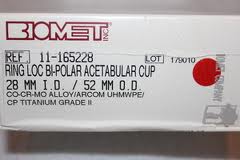Premature Hip Implant Failure leads to $3.5M Verdict. Recently, a U.S. Court of Appeals denied an appeal from Zimmer Biomet for a new trial after a $3.5 million hip implant lawsuit verdict over premature hip implant failure.
Four years ago, in 2020, an Iowan federal jury awarded $3.55 million to Lori Nicholson and her husband Willis for severe personal injuries from the company’s much-maligned and controversial M2a Magnum metal-on-metal hip implant that caused premature hip implant failure.
The jury determined that the M2a Magnum model was defectively designed, and that led to premature hip failure. Around the same time, a federal judge in Missouri granted a $21 million judgment in a case against the M2A Magnum, for similar reasons, namely premature hip implant failure.
Zimmer Biomet argued for a new trial but was denied by the district court and, in a decision filed Aug. 24, the U.S. Court of Appeals for the Eight Circuit affirmed or agreed with that denial.
What’s the Problem with Zimmer Biomet Hips?

Biomet MoM including the M2a and Magnum lines of hip implants had a high incidence of premature failure requiring the need for painful and costly hip revision. Injured? Call Dr. Malik Law Firm 214-390-3189
I am writing about Biomet metal hip implants to inform patients who have had various types of Biomet hip implants in place for more than 10 years and now running into problems with premature hip implant failure.
In 2014, another major orthopedic medical device maker, Zimmer Orthopedics, following U.S. Federal Trade Commission clearance, completed the acquisition of Biomet Orthopedics, and so the new company is known as Zimmer Biomet.
The Biomet M2a hip implant was one of several metal-on-metal (MoM) hip implants that generated significant attention in the orthopedic medical community and among patients.
Biomet MoM line up included the M2a and Magnum models of hip implants, and these had a high incidence of premature hip failure requiring the need for painful and costly hip revision. These hip implants were touted to last up to 20 years, however most began to fail with a few years of implantation. Continue reading
 Dallas Fort Worth Injury Lawyer Blog
Dallas Fort Worth Injury Lawyer Blog

